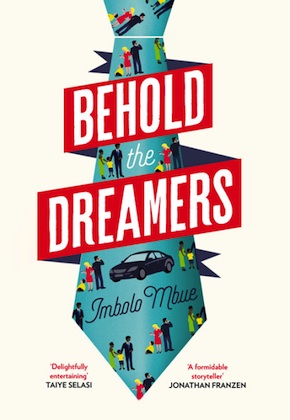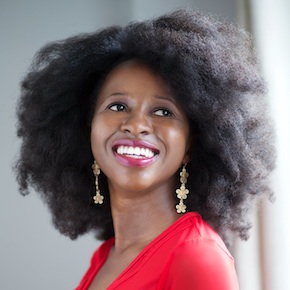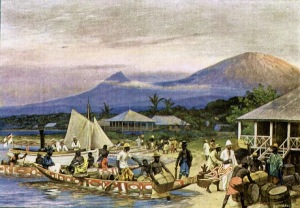A wonder to behold
by Brett Marie
“Eerily timely… bittersweet and buoyant.” Observer
Imbolo Mbue made headlines in the publishing world a couple years ago, when Random House snapped up her debut novel The Longings of Jende Jonga with a million-dollar pre-emptive bid. Mbue, a former market researcher left unemployed after the 2008 crash, had written the story of an African immigrant (like her, a native of Cameroon living in New York), who takes a job as a chauffeur for a Lehman Brothers executive in the year before that company’s devastating collapse.
By the time the book hit US shelves last August, it had a new name: Behold the Dreamers. I couldn’t help being cynical about the change in title. I pictured Random House’s marketing people cringing at the thought of foisting a name like Jende Jonga (the novel’s main character) on the reading public. Forget that the president for the previous seven-plus years had an African name – it would be just like a skittish, play-it-safe publisher to assume the worst about readers’ tastes. Of course they’d opt for a generic title rather than risk their product being passed over by customers too insular (or even too racist) to want to read about a man so decidedly foreign, who comes from a country they might not even have heard of. The whole thing reeked of corporate cowardice.
But as Mbue introduces us to Jende’s wife Neni, then lets us eavesdrop on the backseat phone conversations Jende can’t help hearing from his boss Clark Edwards and Clark’s glamorous wife Cindy, we realise that Jende isn’t the only one doing the longing in this novel. Virtually every character of consequence lets slip a degree of yearning, for a life that’s always just beyond their grasp. As parents, Jende and Neni hope for financial success, so that their son Liomi, currently in elementary school in Harlem, can have the opportunities they believe America has promised hardworking people like them. On the other side of the ethnic gap, Clark and Cindy watch as their college-age son rejects the life they’ve built for him and runs off to India; progressively more estranged from each other, they retreat, Clark into his increasingly frantic work life, and Cindy into alcohol and her high-society social circles, each of them growing more and more frustrated at their inability to keep their family afloat on their material successes. Yes, Jende has his longings, but they are born out of his dream, a dream of security and fulfilment for his family, one that has been laid out for him in innumerable American myths. And he shares his longings with a whole cast of dreamers.
Behold the Dreamers invites us to do just what its title says. But if you’re seeking a decisive comment on the American Dream, be it a ringing endorsement or a stinging rebuke, I advise you to look elsewhere. Jende’s pursuit of opportunity in the Land of the Free only hints at the type of misery awaiting the Lithuanian immigrants of Upton Sinclair’s The Jungle, or the poor Joad family travelling from Oklahoma to California in John Steinbeck’s The Grapes of Wrath. But neither does it offer the patriotic pat on the back you might get from, say, The Amazing Adventures of Kavalier & Clay. Mbue could have written a novel with America as its overarching hero or villain, but for that novel she would have had to sharpen her authorial knife and score political points that I don’t think she is trying for. I think I know all too well her reasons for holding back, and I can sympathise.
We sit in our countries and dream about a better life that awaits us in another country, but what exactly is a better life? Is it truly worth giving up the comforts of home for?”
Living an ocean away from where I grew up, a funny thing happens when I open my mouth to strangers. Within a single, short sentence, as I bite down on my rs and skid over my ts, as likely as not, our talk will wend its way to the loaded question, “Why are you here?” The more intrepid will simply open fire with “Which place is better?” It’s a question I dread, and one which I tend to dodge with “There’s good and bad everywhere you go.” As the drama of the Jonga and Edwards families unfolded, I wondered more and more if Imbolo Mbue was guiding her readers to that same conclusion.
Sure enough, when I asked her about it, Mbue knew exactly what I was talking about. “More and more,” she told me, “I’m realising that the complex feelings Jende and Neni have about Cameroon reflect mine and those of many immigrants I’d spoken to long before I began writing this novel. We sit in our countries and dream about a better life that awaits us in another country, but what exactly is a better life? Is it truly worth giving up the comforts of home for? I recently had a conversation with an immigrant chauffeur and we were talking about this, and he said to me, ‘I didn’t come here for a better life – I came here for safety; I’m safer in America than I was in my country but my life is definitely not better.’”
It seems to me, I told her, that people wanting to know how their country stacked up against mine are simply looking for a confirmation of what they already suspect: depending on their politics, they want either to hear me tell them how grateful I am to be living in their country, or to have me confirm to them that they live in a shithole, and that there’s a place out there where life is indeed grand.
“I suppose it would be much simpler,” she replied, “if we could give a straightforward answer and say ‘My life in America is better,’ or ‘My life in my country was better,’ but like many things in life, there is way more there than can be responded to in one sentence. Yes, America presents opportunities to immigrants which few other countries do, and yes, there are immigrants who can testify to living the American Dream, but for many immigrants I know, even if they’re living this better life, thoughts of their native lands are hardly ever too far from their minds because home is home and, love it or dread it, there is simply no substitute for it.”
It’s not as though Mbue’s African characters don’t love Cameroon; Jende, at least, is prone to nostalgia. But the truth Mbue speaks is often lost on Jende and Neni, who will spend many a chapter in love with a host country that is in actual fact fairly indifferent to them. Even when faced directly with that country’s hypocrisies, they hold the scales fast to their eyes. During a long drive early in the novel, Clark asks Jende about his homeland. After Jende launches into a depiction of his hometown of Limbe as an earthly paradise, Clark asks, “Why did you come to America if your town is so beautiful?” At this, at first, Jende can only laugh uneasily and reply, “But sir, America is America.” Later, as the juggernaut Lehman Brothers falls apart, Jende looks on the ensuing economic catastrophe and is reminded of the plague that befell Egypt in the Old Testament. “Egyptians had been cursed by their own wickedness,” he reasons. “They had called an abomination upon their land by worshipping idols and enslaving their fellow humans, all so they could live in splendor. They had chosen riches over righteousness, rapaciousness over justice. The Americans had done no such thing.”
African or American, rich or poor, each member of Mbue’s cast has a moral lapse at one point or another. But thanks to Mbue’s tremendous sense of empathy, we understand and forgive them.”
Jende will come around to a more nuanced view. And to be sure, there are evils in the world Mbue shows us. But there’s not a single character in this fairly large cast whom I would dream of calling bad. Clark works among the selfish financial freewheelers who brought us the Credit Crunch through their recklessness, but to Jende he is a more or less decent boss. Working so closely with Clark and his family, Jende gets a through-the-keyhole glimpse of a father longing for his eldest son to come back home. Taking work as a housekeeper at the Edwards’ Long Island house over the summer, Neni learns some secrets about Cindy’s painful past, while forming an enduring bond with the Edwards’ younger son.
Many readers will no doubt want to read portrayals of immigrants as noble martyrs. Another stratum of society, which has been making ever more noise in the Brexit/Trump Era, finds it hard to view newcomers to our countries with anything other than suspicion. But neither group will find what they want to see in Mbue’s work. She has spent too much of her life in the world her characters inhabit to shoehorn them into predictable moulds. Her characters, like their countries of origin, are complex creatures, with competing motivations even within themselves, capable of doing good deeds or bad when it suits them. African or American, rich or poor, each member of Mbue’s cast has a moral lapse at one point or another. When, one by one, they begin to betray each other (sometimes with tragic consequences), we feel ourselves betrayed – but thanks to Mbue’s tremendous sense of empathy, we understand and somehow forgive them.
A few months ago, after reading one too many novels with pigment-deficient casts, I added my voice to the call for greater diversity in literature. It occurred to me when I first cracked open Behold the Dreamers that I might suggest the novel to readers looking to diversify their reading. Looking back after finishing the book – after growing to love her characters, shedding tears in places and closing the book with a lump in my throat – I don’t know what I was thinking. To assign this novel as some sort of Affirmative Action exercise is condescending to it and to its author. The book deserves every success: written with tremendous compassion, in the kind of direct prose that pulls the eye effortlessly along while squeezing at the heart in just the right places, Behold the Dreamers is essential not for its diversity, but for its humanity.
 Imbolo Mbue is a native of Limbe, Cameroon. She holds a BS from Rutgers University and an MA from Columbia University. A resident of the United States for more than a decade, she lives in New York City. Behold the Dreamers is published by Fourth Estate in hardback, eBook and audio download.
Imbolo Mbue is a native of Limbe, Cameroon. She holds a BS from Rutgers University and an MA from Columbia University. A resident of the United States for more than a decade, she lives in New York City. Behold the Dreamers is published by Fourth Estate in hardback, eBook and audio download.
Read more.
imbolombue.com
@imbolombue
Author portrait © Kiriko Sano
Brett Marie, also known as Mat Treiber, grew up in Montreal with an American father and a British mother and currently lives in Herefordshire. His short stories such as ‘Sex Education’, ‘The Squeegee Man’ and ‘Black Dress’ and other works have appeared in publications including The New Plains Review, The Impressment Gang and Bookanista, where he is a contributing editor. He recently completed his first novel The Upsetter Blog.
Facebook: Brett Marie
@brettmarie1979


